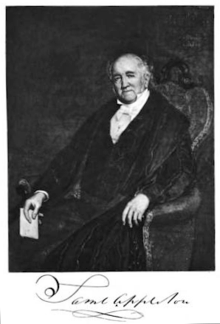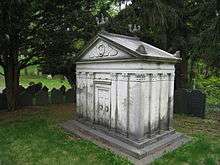Samuel Appleton (merchant)

_%26_Josiah_Johnson_Hawes_(1808-1901).jpg)
Samuel Appleton (June 22, 1766 – July 12, 1853) was an American merchant and philanthropist, active in New Hampshire, Massachusetts, and Great Britain. The city of Appleton, Wisconsin was named in his honor by Amos Lawrence.
Biography
Appleton was born in New Ipswich, New Hampshire. From 1790 to 1792, he cleared fields in Maine for farming. He also taught school. For a time he kept a store in Ipswich. In 1794, he moved to Boston where he became an importer in partnership with his brother Nathan as S. & N. Appleton, buying European dry goods at auction and for resale to country traders in exchange for homespun cloth as well as pot and pearl ash for export to Britain. He also later established cotton mills at Waltham and Lowell, Massachusetts. After 1799 he passed much of his time in Britain, and at age 53 married a widow, Mrs. Mary Gore, with whom he had no children. He retired from business in 1823.

After retirement he devoted much of his fortune to charity, including his gift funding the Appleton Cabinet at Amherst College, built to house the Hitchcock Ichnological Cabinet, and the Appleton Chapel at Harvard University. He endowed the academy at New Ipswich with a fund which secured its permanence, and founded the professorship of natural philosophy of Dartmouth College, with a gift of $10,000.[1]
Appleton served as a vestryman of King's Chapel from 1830 to 1840, and monument to him sits on the north wall of the chapel.[2] Wilson's biographical directory of Boston's business aristocracy, published 1848, noted that it was “to the credit of Samuel Appleton, that he commenced life with a single four-pence half penny, paid to him by a drover who passed his father's house, for assistance in driving [cattle].”
At his death, Appleton's fortune amounted to nearly $1,000,000, and he had given away nearly as much as that during his lifetime. By his will he placed property to the amount of $200,000 in the hands of his executors, “to be by them applied, disposed of, and distributed, for scientific, literary, religious, and charitable purposes.”[1]
Historic ship
The 1846 ship Samuel Appleton, 808 tons, was built by P. Curtis in Medford, MA, and owned by the prominent merchant Daniel Pinckney Parker of Boston.[3]
Notes
- 1 2
 "Appleton, Samuel". The American Cyclopædia. 1879.
"Appleton, Samuel". The American Cyclopædia. 1879.
- ↑ Henry Wilder Foote, Henry Herbert Edes, John Carroll Perkins, Winslow Warren, Annals of King's Chapel from the Puritan age of New England to the present day, Volume 2 (Little, Brown, 1896) pg. 533-535 http://books.google.com/books?id=yfMWAAAAYAAJ&source=gbs_navlinks_s
- ↑ Gleason, Hall (1937). Old Ships and Ship-Building Days of Medford. Medford, MA: J.C. Miller. p. 71.
References
- Mann, Anthony, "How 'poor country boys' became Boston Brahmins: The rise of the Appletons and the Lawrences in ante-bellum Massachusetts", Historical Journal of Massachusetts, Winter 2003.
- Peabody, Ephraim, "Notice of Samuel Appleton, Esq.", New England Historical and Genealogical Review, 8 (January, 1854), 12.
- Wilson, Thomas L V, The Aristocracy of Boston; who they are, and what they were; being a history of Business and Business Men of Boston, for the last forty years, Boston : Thomas Wilson, 1848.
-
 Wilson, James Grant; Fiske, John, eds. (1900). "Appleton, Samuel". Appletons' Cyclopædia of American Biography. New York: D. Appleton.
Wilson, James Grant; Fiske, John, eds. (1900). "Appleton, Samuel". Appletons' Cyclopædia of American Biography. New York: D. Appleton.
External links
- Works by Samuel Appleton at Project Gutenberg
- Works by or about Samuel Appleton at Internet Archive
- The Will of Samuel Appleton, with remarks by one of the executors
- Daguerreotype of Samuel Appleton from a Sotheby's sale: http://www.sothebys.com/en/catalogues/ecatalogue.html/2008/photographs-n08424#/r=/en/ecat.fhtml.N08424.html+r.m=/en/ecat.lot.N08424.html/168/
|